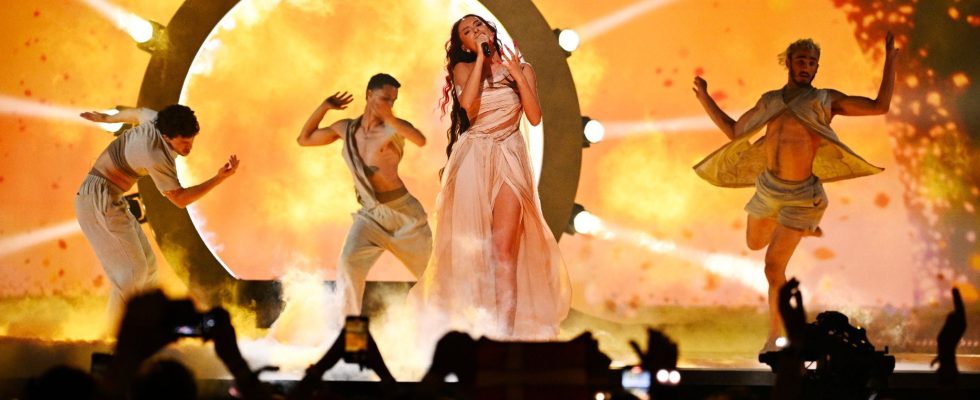The initial version of his song had to be modified because it alluded to the Hamas attack which bloodied Israel on October 7. The young Israeli artist Eden Golan won her ticket on Thursday May 9 evening for the Eurovision final with the song “Hurricane”. Israel thus joins the group of 26 countries which will compete on Saturday to succeed Sweden as winner of this competition followed by tens of millions of viewers each year. The country’s participation is contested due to the ongoing war in Gaza and a protest took place in host city Malmö on the same day.
Israel has participated in Eurovision since 1973, winning it for the fourth time in 2018. “I am so grateful to everyone who voted for us and supported us,” said its candidate. “It’s really an honor to be here, on stage, to perform and show our voice, to present ourselves with pride,” she said.
On Friday, the country was second favorite for the final victory behind Croatia and ahead of Switzerland, according to the online betting site comparator Oddschecker.com. Before the semi-final, Israeli Prime Minister Benjamin Netanyahu declared in a video message to the singer that his country’s candidate had “already won”, saying that she was “successfully confronting a horrible wave of anti-Semitism”.
Demonstration and calls for boycott
In 2022, Russian broadcasting companies were excluded from the European Broadcasting Union (EBU), which oversees the competition, in the wake of the war in Ukraine. This year, the Ukrainian conflict has been overshadowed by the war in Gaza, which began on October 7 when Hamas commandos carried out an attack on Israel.
According to the police, between 10,000 and 12,000 people demonstrated Thursday afternoon in the streets of Malmö against Israel’s participation in Eurovision, expressing their indignation at the war in Gaza and planning a new rally on the day. of the final. At the start of the evening, around fifty pro-Palestinian demonstrators gathered in front of the Malmö arena, where the European song competition takes place, before being moved by numerous police officers. Protesters also gathered at the Eurovision village, where the semi-final in which Israel competes is to be broadcast on the big screen.
“This year we are boycotting completely,” Cecilia Brudell, 31, told AFP in the crowd which also included climate activist Greta Thunberg. “I’m a fan of Eurovision and it breaks my heart but I’m boycotting,” testified another participant. “I can’t have fun knowing that Israel is participating, when all these children are dying. I think it’s unfair.” “If they can exclude Russia, why can’t they do it for” Israel, asked Marwo Mustafa, a young demonstrator in her twenties.
Across Europe, several petitions are calling for the country’s exclusion from this competition. The neutrality of tele-hook was even shaken up on Tuesday during the first semi-final by Swedish singer Eric Saade, who wore a Palestinian keffiyeh around his arm. A gesture regretted by the EBU and by Swedish public television SVT, who claim the apolitical nature of this popular meeting. At the end of March, candidates from nine countries, including the Swiss Nemo, one of the favorites, also called for a lasting ceasefire in Gaza. Representatives of some countries had considered boycotting the competition to protest Israel’s presence, but ultimately did not follow through.
Increased security in Malmö
“Hurricane” was, however, performed without a hitch or interruption on Thursday evening by Eden Golan in front of the 9,000 spectators at the Malmö Arena, exhilarated by the competition. Inside the room, the EBU had as usual banned any flags other than those of the participants and any banners with political messages. Security has also been reinforced both in the Malmö Arena and in the rest of this city in southern Sweden, where the country’s largest community of Palestinian origin lives and where Palestinian flags rub shoulders with brightly colored pennants. While Sweden raised its alert level last year after acts of desecration of the Koran, “there is no threat directed against Eurovision”, assured Jimmy Modin, a spokesperson for the police.
“The EBU is taking all the necessary precautions to make this place a safe and united place for everyone,” said Eden Golan after the semi-final, who was the subject of threats on social networks.
100,000 fans expected
For fans – the city expects up to 100,000 visitors on Saturday – “it’s what is on stage that is important: the contributions, the artists and the music, and not politics”, believes the history professor ideas Andreas Önnerfors, Eurovision specialist. Almost seventy years old, this competition which was followed in 2023 by 162 million viewers is “a demonstration of European tolerance which is not found in other forms or in other places”, he underlines.
However, within the Jewish community of Malmö, some plan to leave the city for the weekend. “With Eurovision, there is a sort of intensification. The feeling of insecurity increased after October 7, many Jews are worried,” explained a spokesperson, Fredrik Sieradzki. According to him, the numerous pro-Palestinian demonstrations did not, however, give rise to calls targeting the city’s Jews. Security around the synagogue has nevertheless been reinforced.
